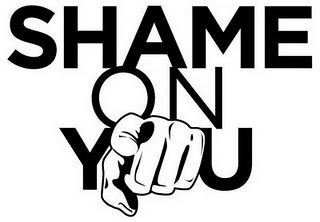
Shame on you. Wow. Just notice how those three little words can ruin a good day. Feel them in your body, and observe how your physical self cringes. And yet, for every external message of shame we receive, how many more do we deliver to ourselves? In order to heal our shame, we must understand it.
Shame, at its core, is good. Yes, good. We want to feel shame when we think about hitting another in a moment of fury. We want it to stay our hand. We live in a world of others, are designed at our deepest mammalian level to crave connection. Shame warns us that we are, potentially or actually, invaders or invaded, and therefore at risk of losing those precious bonds. At the highest level, we experience shame when we see violations of unity on a global scale, and it drives us to action.
Shame, filtered through millennia of ever-more-complicated human processing (ah, the downside of our neocortex!), can be quite toxic. Either in service to some continually changing and even reversing human ideal, or to a prevailing power structure that cleverly thwarts the inner power of those it seeks to control, toxic shame damages. It leaves us suspicious of each other, knowing that at any point we might bump up against each other’s rules. In the end, many of us can only bear living in a world of others by disconnecting from the very thing that holds life, vitality for each of us…our bodies.
For shame is not just a thought, it is a profound physical reaction, marked in human and other mammals by averted and often down-turned eyes, dropped head, concave chest, shallow breath. Like a sea anemone responding to threat, we literally close up in the face of others judgment, or our own merciless self-judgment.

And what is the impact to you, dear reader, of living with toxic shame? How often in a day do you “should” yourself, do you blame yourself for not being enough, doing enough? How much do you live, on some level, in fear of judgment by others, even when your intellectual mind tells you over and over that no one’s really noticing, and that they’re no better or worse than you. Dozens of times a day, your body gets slammed with some social inadequacy…somebody’s feelings get hurt, including yours, some subtle rule gets broken. And each time, a little more energy leaks out as your body constricts a little more.
What can you do? Try this: recall some recent event at which you or others recognized you did well, or a quality you appreciate and feel good about in yourself. If you can, then notice, as you replay the event or a show of this quality you like, how your body shifts. Even if only a little. Stay with it. See what happens. Our ability to sincerely appreciate something in ourselves, to feel perhaps what one could call pride, is the counter to shame. Drink this in, considering self-satisfaction your psychic multivitamin. And if you can’t get there alone, reach out. You have the right to stand in your own power, your own light. You are the greatest gift you can give to the world.
Feel free to enjoy what Brene Brown has to say about shame:
(Next week, part two: Psychotherapy’s own particularly twisted contribution to shame!)